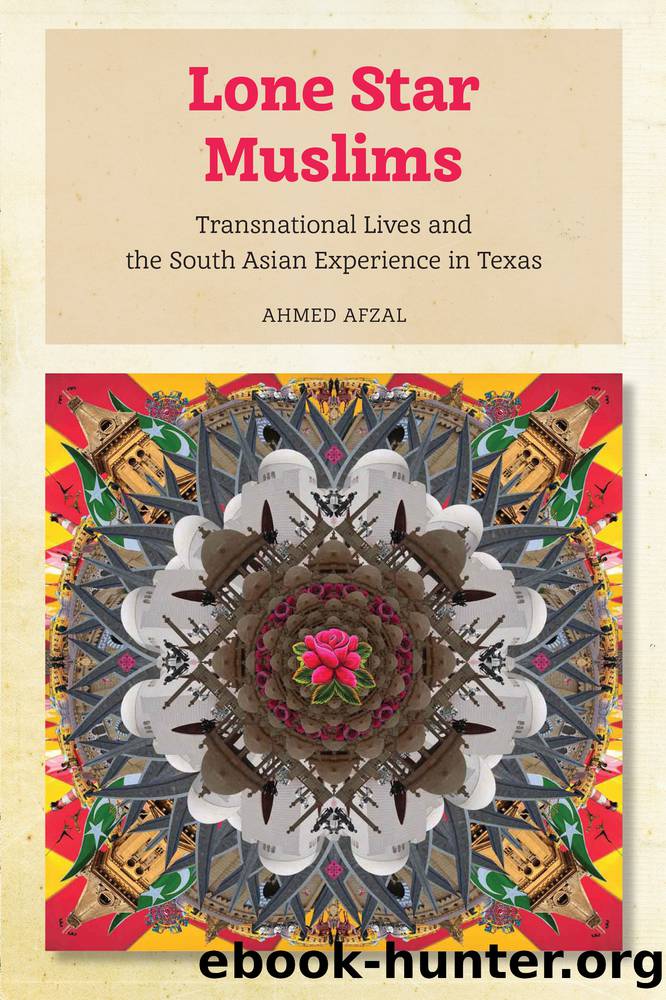Lone Star Muslims by Ahmed Afzal

Author:Ahmed Afzal
Language: eng
Format: epub
ISBN: 9781479855346
Publisher: NYU Press
Published: 2015-08-15T00:00:00+00:00
Yaar
In seeking relationships, my Pakistani gay male interlocutors search for men who share their religious and ethnic background. Although these Pakistani men venture regularly into predominantly gay spacesâfor example, the bars, clubs and other gay-owned business establishments in the Montrose District (and beyond) in Houstonâthey often experience these places with other Muslim gay men. In conversations over dinner, at a bar, or sitting in a cafe, these men readily espouse their preference for a Pakistani Muslim boyfriend. While we were having coffee at a café in Montrose, Aamir said to me:
I definitely want to be in a relationship with another Pakistani guy [pause]. We would be able to understand each other more [pause]. We would have the same religion and culture [pause]. I think our relationship would be more successful because of this.
Aamir had paused before continuing:
Basically, I want a yaar, you know? [I want] someone who can be a special friend with whom I can share everything.â
On another occasion, Shahrukh similarly invoked the notion of yaar to describe what was missing in his relationship with Mario, a gay Mexican American man in his twenties, whom he had been dating for a couple of years. Even though he cared deeply for Mario, Shahrukh was unsure if the relationship had a future. When I asked Shahrukh why, he had paused, searching for the right word to describe his concerns. âI donât know what it is [pause]. Mario and I have a great sexual relationship, and I know that he loves me but [pause] I donât know how to describe it [long pause]. I want to be with someone who is a friend, [pause] a dost [friend].â
These brief fragments from everyday conversations converge on the invocation of the notion of yaar to describe the ideal relationship or âspecial friendshipâ as Aamir termed it. There are several interchangeably used words for âfriendâ in Urdu and Hindi, among them dost, humsafar, saathi, and yaar. The appropriation of these words among my interlocutors shows the subversive potential of these words to encapsulate same-sex sexual friendships. Shahrukh, for example, had used the term dost and Aamir had used the term yaar. The pauses in the conversation in both instances, as both Aamir and Shahrukh searched for the right word in English, and code switching between Urdu and English illustrate the difficulties in translating the notions of yaar or dost. For diasporic subjects like Aamir and Shahrukh who appropriate Western classifications and categories of sexuality in constructing a gay identity, such pauses are suggestive of âdisidentificationâ (Munoz 1999; Medina 2012), a strategy of resistance that âworks within and outside the dominant public sphere simultaneouslyâ (Munoz 1999: 5), and indexes âa multiplicity of interlocking identity componentsâ (ibid.: 8). Aamir and Shahrukh, for example, resisted using English and words like âfriendâ and âboyfriend,â persisting instead in situating romantic friendships within South Asian cultural linguistic specificities.
The language use among diasporic gay Pakistanis demonstrates the transnational circulation of scripts for making meaning of South Asian same-sex sexual eroticism and friendships between men, and between women as well.
Download
This site does not store any files on its server. We only index and link to content provided by other sites. Please contact the content providers to delete copyright contents if any and email us, we'll remove relevant links or contents immediately.
The Lost Art of Listening by Michael P. Nichols(7507)
Why I Am Not A Calvinist by Dr. Peter S. Ruckman(4154)
The Rosicrucians by Christopher McIntosh(3521)
Wicca: a guide for the solitary practitioner by Scott Cunningham(3180)
Signature in the Cell: DNA and the Evidence for Intelligent Design by Stephen C. Meyer(3140)
Real Sex by Lauren F. Winner(3025)
The Holy Spirit by Billy Graham(2954)
To Light a Sacred Flame by Silver RavenWolf(2825)
The End of Faith by Sam Harris(2744)
The Gnostic Gospels by Pagels Elaine(2536)
Waking Up by Sam Harris(2461)
Nine Parts of Desire by Geraldine Brooks(2370)
Jesus by Paul Johnson(2364)
Devil, The by Almond Philip C(2334)
The God delusion by Richard Dawkins(2312)
Heavens on Earth by Michael Shermer(2285)
Kundalini by Gopi Krishna(2187)
Chosen by God by R. C. Sproul(2165)
The Nature of Consciousness by Rupert Spira(2109)
